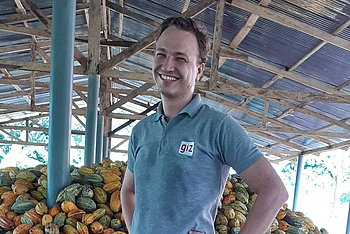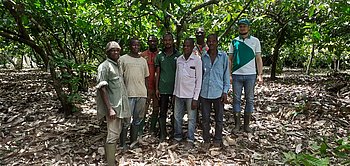Research is a marathon, not a sprint
Project Manager in Wood Research

I have had the opportunity to share my skills and knowledge with others overseas twice through working in development service. My first term of development service was from 2017 to 2019, when I went to Cameroon as a professional worker with GIZ. My wife Bárbara and I were first located in Buea, a city in southwest Cameroon. Here, I advised the regional forest management services and local cooperatives that bordered the national park on the sustainable use of non-timber forest products such as nuts, mushrooms, leaves, and wild fruits. The aim was to raise the income of local women’s cooperatives, as well as to better structure the value chain of these products and ensure that they are harvested in a regulated manner. As the political situation in Cameroon worsened, we had to move to the capital, Yaoundé, in 2018 for our own safety. Here, I was able to continue my regional work as well as take it to the national level, advising the Ministry of Forestry and Wildlife on strategic questions surrounding non-timber forest products. In late 2019 I moved to the Netherlands to reunite with Bárbara, who had moved there six months prior to begin her doctoral studies at Wageningen University.
A Fascination for Wood
I have been fascinated by wood since I was a child – I would tinker with it on my workbench from an early age. It surprised no one that I would go on to study wood science at the University of Hamburg. During my studies, I was introduced to the countless possible uses for wood and the distinct qualities of the main kinds of timber. I also took part in internships in southeast Asia and a semester abroad in Brazil, which developed my interest in tropical forestry management. For this reason, I went on to complete a master’s degree in tropical forestry at the University of Göttingen. This was where I had my first introduction to development work. I carried out the work for my master’s thesis in Ghana, where I interviewed cacao farmers on their knowledge of shade trees in their plantations. Following this, I gained my first professional experience in a research project that used genetic methods to track important species of traded timber. I coordinated sampling in twelve countries and also carried out part of the field work in Brazil.
My work in development service in Cameroon inspired me to pursue a doctoral degree. Thus, I began applying for PhD positions and contacting professors and doctoral students in the Netherlands, where my wife was already studying for her own PhD. In early 2020 I began familiarizing myself with my preferred specialization: multifunctional forestry in the tropics. Unfortunately, the Covid-19 pandemic threw a spanner in the works. Suddenly, all the professors were busy trying to fulfil their teaching responsibilities in a digital capacity and funding for new research projects was either slashed or suspended due to the uncertainty of the situation.
I used the time to further familiarise myself with the topic and create a research project proposal. I shared this with professors across the Netherlands and waited for their feedback. I also took advantage of AGdD’s ProfilPASS competence assessment programme to help me determine my strengths and increase my chances when applying for PhD positions. This was a great tool for helping me become aware of my own skills and knowledge.
Return to Africa
By autumn of 2020, there was still no doctoral position for me in sight. Although several professors at Wageningen University had expressed interest in supervising my doctoral project, there were no funding or grants to finance it. I also had few personal connections in the Netherlands. For this reason, I decided to rejoin development service for a short while and go to Togo in late 2020 with GIZ. Over the course of a year, I advised cacao farmers and supervised the construction of cacao fermentation and drying facilities. The aim was to achieve a more uniform bean quality. In 2022 I returned to the Netherlands for a temporary position at Wageningen University, where I carried out a literature study on sustainable tropical forestry and compared different certification systems.
I have always been fascinated by academic work and I enjoy dealing with a specific topic in-depth for long periods of time. For this reason, I was very excited to be offered a doctoral position at Giessen University specializing on the sustainable use of resources. This meant that I was finally (!) able to begin my doctoral project in late 2022.
However, the collaboration with our partners in Angola got off to a difficult start. I also had several differences of opinion with my supervisor about the content of my research as well as the conditions under which it was being carried out. After my visit to Angola in the summer of 2023, I decided to hand in my notice and return to Bárbara in the Netherlands.
Working in Wood Research
I found my current position as a project manager at SHR (Stichting Hout Research, or “Wood Research Foundation” in English) thanks to a lucky coincidence. When I returned to the Netherlands in autumn 2023, an acquaintance who worked at SHR told me that they had several open positions. In the Netherlands there are no training programs that specialise in wood processing, nor are there degree programs in wood science. This meant my CV and professional experience were received with great interest.
However, a condition of working for SHR was that I had to be able to speak Dutch. While I had a good grasp of the basics, I was not yet able to understand complex sentence structures and topics. Thus, I attended a language course from winter 2023 to improve my language skills and I am now capable of writing project and test reports independently in Dutch.
A Broad Range of Tasks
As a project manager at SHR I carry out a range of standard tests, primarily on finger-joined lumber, laminated timber and chipboard. In practice, this often means performing mechanical stress tests and durability tests. For example, one test might involve investigating the extent to which new types of timber intended for use as window frames absorb water, i.e., calculating how much the timber swells and shrinks under certain conditions. This is important for determining whether the timber is suitable for use as window frames.
We work according to various official standards and the tasks demand high levels of concentration and accuracy. I often need to familiarise myself with the standards and evaluation guidelines for specific tests to ensure that we can carry these out in a technically correct manner. I also carry out life cycle assessments for products. For example, I am currently establishing the environmental impact of a project that produces chipboard from hemp fibres.
Drawing on Past Experiences
The experience I gained in project management during development service is invaluable in my current work. My language skills and my ability to quickly get to grips with new, unfamiliar situations are also of great use in my day-to-day work.
Like my work in Cameroon and Togo, close cooperations with colleagues and contractors play) an important role, as does the timely completion of project reports. My position also demands a high level of responsibility and initiative, and the ability to organise my own work well. As with development work, it is important to set the right priorities and to communicate openly with everyone involved, for example in the event of delays or a change in plans.
Summary

I love working with wood and being in a position to work with this material every day. I particularly enjoy the diversity of my work. We work with a range of very different testing methods. This requires a lot of practice and experience, but I am becoming more and more comfortable and secure in carrying out these unique processes. I also enjoy the mixture of practical work and paperwork. One thing I do miss about development service is the intense contact you have with people.
Research is a marathon, not a sprint. If you wish to work in this field, you need to have a certain level of endurance. There are always setbacks and changes. This is why I believe it is so important to have a personal interest in your topic of research. Knowing your personal motivation is crucial in moments when success seems out of reach; it helps you have the strength to carry on.
